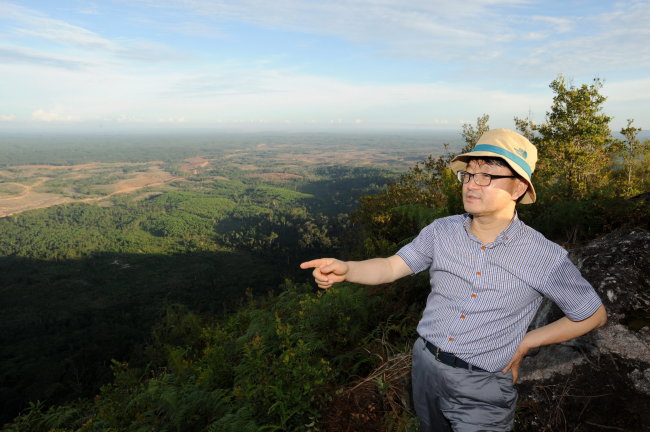Korea Forest Service Minister Shin Won-sop visited Indonesia to discuss cooperation with Indonesian government officials in the forestry field and to participate in a forum last week. He discussed a wide range of issues related to the opening of an eco-education program on forestry near Jakarta, overseas plantation investment and Korean companies’ participation in Indonesia’s development of forestry resources. He also toured Korean companies’ plantations in the Southeast Asian country.
Following is an interview with the KFS minister in Indonesia.
Q: You have recently participated in the meeting of the 21st Korea-Indonesia Forest Cooperative Committee. What are key implications of the committee meeting?
A: Indonesia is a country with rich forest resources and where more than 60 percent of Korea’s overseas forest development projects are underway. Through the committee meeting, we discussed details of how Korean companies can work on expanding investment in Indonesia’s forest resources. Also, the meeting was meaningful in terms of further expanding our bilateral cooperation in forest recreation and ecological education.
Q: Celebrating the 40th anniversary of diplomatic ties between Korea and Indonesia, a book which deals with the story of the record-long bilateral cooperation in forestry was published. What is your evaluation of this publication?
A: Since 1973 when Korea and Indonesia first established diplomatic relations, the two countries have expanded cooperation in forestry in a more systematic manner than in any other area. The exchanges and cooperation in this sector especially deepened after the establishments of Korea-Indonesia Forest Cooperative Committee in 1979 and the Korea-Indonesia Forest Forum in 2007. In the early stages, the cooperation was made in such sectors as forest development and investment, but it has been diversified and expanded to research and development, human resources development, responses to climate change and education on forests and leisure.
 |
KFS Minister Shin Won-sop visits the forest plantation operated by Korindo in Pangkalan Bun, Kalimantan, Indonesia, last week. (KFS) |
Q: Sentul Eco-edu Model Forest, a landmark bilateral project for cooperation in forestry, was open ahead of the Forest Cooperative Committee meeting. What do you expect from the project?
A: The Sentul Eco-edu Model Forest has easy access from the capital city Jakarta. This forest area can show how forestry is important to citizens and offer them a chance to learn about its importance. This place is also expected to provide citizens with various forest recreational service programs as well.
Q: What were key agenda items of the committee meeting and what kind of progress was made?
A: There were a variety of agenda items in the meeting, including the development of a green zone for cooperation in the Sentul Eco-edu Model Forest, vitalization of investment in Indonesian forests, a development forest cooperative model, cooperation with businesses of the Asian Forest Cooperation Organization and information sharing in the forest industry.
Regarding progress during the meeting, the two countries had come up with a consensus to develop forest recreation and eco-education areas.
Q: The Indonesian government will support and cooperate with the ASEAN-Korea Forest Cooperation, which Korea initiated in 2011. What is AFoCO’s role in the international community?
A: It is driven by ASEAN member states and expected to embrace a lot more countries in Asia. The Indonesian government has promised to support AFoCO and Korea will share its successful forestation experiences with other countries through the organization. Therefore, AFoCO is expected to present a new model for international cooperation in forestry among Asian countries by providing practical solutions in terms of dealing with an issue of climate change and coming up with a solution involving forestation.
Q: Many Korean companies have already entered the Indonesian forestry market and more companies are expected to join. I’ve heard that you have visited Korindo Group’s business site in Kalimantan, a Korean company doing business in Indonesia. What did you learn during your visit?
A: I was impressed with Korindo group, which is making continuous efforts and investments to convert a vast area of land into valuable forest resources in Indonesia. If we help Korean companies to cope with challenges and difficulties that they face while doing business overseas and provide them with supportive policies, we will create a lot more success cases like the Korindo forestation project.
Q: During your visit to Indonesia, you had a meeting with Korean companies doing business in Indonesia, in which areas did they want to be supported and what measures can you take to support them?
A: We have developed several policies to facilitate local companies to increase overseas investments in forestry. We are going to strengthen ties with other countries to offer local companies eased administrative procedures in business registration. We also provide taxation benefits to companies making investments in forestry overseas, while supporting investments in biomass energy.
Q: There are many other countries beyond Indonesia that Korea is helping to develop forest resources overseas. Could you be more specific?
A: Currently, Korea has developed relations with 21 counties for international partnership, including Cambodia, Vietnam, New Zealand and Paraguay. Every two years, we host a cooperation meeting with each country to provide them with better information on investment environment and financing.
By Lee Kwon-hyung (
kwonhl@heraldcorp.com)
Intern reporter Choi In-jeong contributed to this report. ― Ed.








